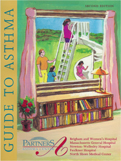Guide to Asthma
Lesson #2: Asthma "Triggers"
If you have had asthma for any length of time, you have likely come to identify some of the things that make it worse. You may have found that if you run to catch the bus on a cold winter’s day, you begin to cough and breathe heavily once you sit quietly in your bus seat. Perhaps if you are around cigarette smoke or strong perfumes, you experience tightening in your chest and need to use your asthma medications. And if a simple head cold settles in your chest, you begin to wheeze and become seriously short of breath.
Knowing what will set off your asthma symptoms is important because it is then often possible to stay healthy simply by avoiding those "sparks" that can cause your asthma to flare up. Sometimes avoidance is relatively easy, like staying away from the pet cat at your mother-in-law’s house. Other times it involves hard work, like removing mold and mildew from the bathroom or reducing dust accumulation in the bedroom. The pay off is better breathing and fewer attacks of asthma.
It may not be possible to pinpoint each time exactly what makes one’s asthma worse. But everyone with asthma has a group of known items that will "trigger off" their asthma symptoms. We share in common some asthmatic triggers, like vigorous exercise, cigarette smoke exposure, emotional stress, heavy air pollution, and viral respiratory infections. Others are based on our particular allergic sensitivities and will differ among different people. For instance, some persons with asthma are made worse by the pollens of springtime flowering trees and grasses, others are not.
Most of the allergens that cause worsening asthma are airborne and cause trouble when breathed in. Common examples include dust, cat and dog danders, bird feathers, and mold/mildew. These are allergic-type triggers that we are as likely to encounter indoors in our homes as outside in the backyard. If you are uncertain about your allergic sensitivities, allergy testing (skin tests or blood tests) can help to identify those things that cause you to make an allergic reaction.
Certain medicines can be asthmatic triggers. All persons with asthma should avoid the group of medicines called beta blockers, used to treat heart disease, high blood pressure, and glaucoma. Aspirin is a trigger for asthma in a small number of adults (about 1 in 20 persons with asthma). If your asthma is made worse by aspirin, you must also avoid all of the non-steroidal antiinflammatory drugs (NSAID’s) like ibuprofen, naproxen, and ketoprofen, that are widely used for pain relief. Acetaminophen (Tylenol®) is safe for use if you have aspirin sensitivity.
The workplace can also be filled with asthmatic triggers. Certain occupations are particularly difficult, including many manufacturing jobs, construction work, and food processing industries. Leaving that particular work area is the best option; use of a respirator mask is sometimes possible as an alternative.
A good place to begin to get your asthma under better control is in your home. Take care to eliminate or minimize those triggers in the home that may be making your asthma worse. Doing so can also help to keep your allergic children from ever developing asthma.

